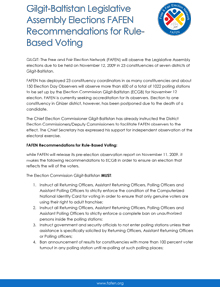ISLAMABAD: Procedural inadequacies, ineffective management and lackluster response of the eligible voters that may have serious implications on the final electoral rolls mar the ongoing display of Draft Electoral Rolls.
According to reports received from observers of the Free and Fair Election Network (FAFEN) across 70 districts reveal that 27.35% Display Centres opened late and closed before the official timings. The FAFEN observers also found that 14.40% Display Centre Information Officers (DCIOs) were absent from the centres.
It is to be noted that the FAFEN has deployed 750 observers countrywide to monitor the Draft Electoral Roll Display Centres.
The reports showed that 89.92% Display Centres have been provided electoral roll while 10.08% centres are still waiting for the same. Female voter lists have also been provided at 91.01% Display Centres while 8.99% Display Centres are functioning without female voter lists. It is observed that daily timing of the Display Centres is mentioned on only 29.36% banners while 70.64% banners are without daily timetable. It is also witnessed that only 34.98% banners are covered with the name of constituencies while the remaining 65.02% are without the name of electoral areas.
The 82.17% Display Centres have sufficient quantity of forms for inclusion and exclusion of names and correction of details, while 17.83% centres facing shortage of above mentioned forms. 79.98% display centres have three logbooks for record, but the other 20.02% have no logbooks for record.
The public interest in the display of draft rolls is very low in all the surveyed locations areas, said the reports.
In order to enhance the interest of the public and to prepare error free electoral rolls, we urge the Election Commission of Pakistan to improve the management of the display centres on priority basis and to make available draft rolls on its website.
About Free and Fair Election Network (FAFEN)
FAFEN, a coalition of thirty leading Pakistani civil society organizations, was established in 2006 to observe the election process, educate voters, and advocate for electoral and democratic reform.


